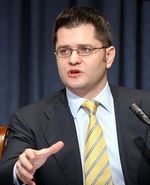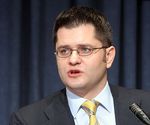Q:
A:
Serbia will insist in UN on new negotiations on Kosovo-Metohija issue
Belgrade,
12 July 2010
Minister of Foreign Affairs Vuk Jeremic stated today that he believes that the International Court of Justice (ICJ) will not support a violation of international law by lending legitimacy to the unilateral declaration of independence by Kosovo. A favourable decision by the Court will greatly enhance Serbia’s diplomatic position in the difficult period ahead.
In an interview with the Blic daily, Jeremic emphasised that it would be logical to form a majority in the UN General Assembly, of the opinion that only new negotiations can yield a solution based on compromise for the Kosovo-Metohija issue.
Debate in the General Assembly will be the moment of truth and probably the most crucial episode in Serbia’s strategic diplomatic struggle, he declared.
The outcome of the debate will be a starting point for further developments concerning the Kosovo-Metohija issue. Serbia will most certainly have to go through an incomparably more difficult period than last time but Serbia has no choice and must fight to win a majority, he elaborated.
It is becoming apparent that the ICJ will make its decision in the very near future and according to various sources of information we have reason for optimism, Jeremic remarked.
Responding to the question whether after the Court’s decision Serbia will propose a resolution on new negotiations on the issue of Kosovo-Metohija, Jeremic explained that under UN procedure the Court submits its opinion to the body that requested it, which is the General Assembly, and that it is also the norm that the country which initiated the process proposes a final conclusion.
Serbia is focused on its efforts to initiate a new beginning in the negotiation process and a few very powerful countries are strongly opposing these efforts, he observed.
I am convinced that we will be successful in the end if we do not give in to pressure and continue with hard work, Jeremic asserted.
Considering the fact that we truly wish to reach a compromise, we are ready to show flexibility, but we cannot begin a dialogue based on any other stance but the one we took at the moment when the Albanian side left the negotiating table and opted for secession, he outlined.
Asked whether he thinks that the European Parliament’s Resolution will pressurize the five EU countries which have not recognised Kosovo into doing so, the Minister said that this step by the European Parliament, which is not responsible for these issues and which cannot pass binding resolutions, was taken to put pressure on Serbia and its EU allies, however, this is certainly not good news.
We made maximum efforts to organise resistance to the Resolution within the European Parliament and it was passed with far fewer votes in favour than expected, recalled Jeremic.
This shows that the EU is still deeply divided concerning the Kosovo-Metohija issue and it is not realistic that consensus will be reached regarding the so called “independence” of the province, he highlighted.
There are far more serious obstacles in the EU enlargement process in the Balkans than the political differences which a certain number of countries have with Serbia concerning Kosovo-Metohija, he affirmed.
Those who are blocking the accession process would not change their stance even if Serbia were to give up its principled policy, he illustrated.
Of course, we are not giving up our goal of membership and we are constantly in touch with Brussels and other capitals. But we must be realistic and acknowledge that the current situation in Europe is not favourable, Jeremic pointed out.
Even those most sceptic can see that during the last few years Serbia has emerged as a natural focal point in the Western Balkans, he expounded.
Not a single regional issue can be resolved without Serbia’s principled and constructive participation. This is proved by the fact that Serbia competed for and won the rotating presidency of three important regional organisations – the South Eastern European Cooperation Process, the Central European and the Adriatic – Ionian Initiative, concluded the Foreign Minister.
Debate in the General Assembly will be the moment of truth and probably the most crucial episode in Serbia’s strategic diplomatic struggle, he declared.
The outcome of the debate will be a starting point for further developments concerning the Kosovo-Metohija issue. Serbia will most certainly have to go through an incomparably more difficult period than last time but Serbia has no choice and must fight to win a majority, he elaborated.
It is becoming apparent that the ICJ will make its decision in the very near future and according to various sources of information we have reason for optimism, Jeremic remarked.
Responding to the question whether after the Court’s decision Serbia will propose a resolution on new negotiations on the issue of Kosovo-Metohija, Jeremic explained that under UN procedure the Court submits its opinion to the body that requested it, which is the General Assembly, and that it is also the norm that the country which initiated the process proposes a final conclusion.
Serbia is focused on its efforts to initiate a new beginning in the negotiation process and a few very powerful countries are strongly opposing these efforts, he observed.
I am convinced that we will be successful in the end if we do not give in to pressure and continue with hard work, Jeremic asserted.
Considering the fact that we truly wish to reach a compromise, we are ready to show flexibility, but we cannot begin a dialogue based on any other stance but the one we took at the moment when the Albanian side left the negotiating table and opted for secession, he outlined.
Asked whether he thinks that the European Parliament’s Resolution will pressurize the five EU countries which have not recognised Kosovo into doing so, the Minister said that this step by the European Parliament, which is not responsible for these issues and which cannot pass binding resolutions, was taken to put pressure on Serbia and its EU allies, however, this is certainly not good news.
We made maximum efforts to organise resistance to the Resolution within the European Parliament and it was passed with far fewer votes in favour than expected, recalled Jeremic.
This shows that the EU is still deeply divided concerning the Kosovo-Metohija issue and it is not realistic that consensus will be reached regarding the so called “independence” of the province, he highlighted.
There are far more serious obstacles in the EU enlargement process in the Balkans than the political differences which a certain number of countries have with Serbia concerning Kosovo-Metohija, he affirmed.
Those who are blocking the accession process would not change their stance even if Serbia were to give up its principled policy, he illustrated.
Of course, we are not giving up our goal of membership and we are constantly in touch with Brussels and other capitals. But we must be realistic and acknowledge that the current situation in Europe is not favourable, Jeremic pointed out.
Even those most sceptic can see that during the last few years Serbia has emerged as a natural focal point in the Western Balkans, he expounded.
Not a single regional issue can be resolved without Serbia’s principled and constructive participation. This is proved by the fact that Serbia competed for and won the rotating presidency of three important regional organisations – the South Eastern European Cooperation Process, the Central European and the Adriatic – Ionian Initiative, concluded the Foreign Minister.











